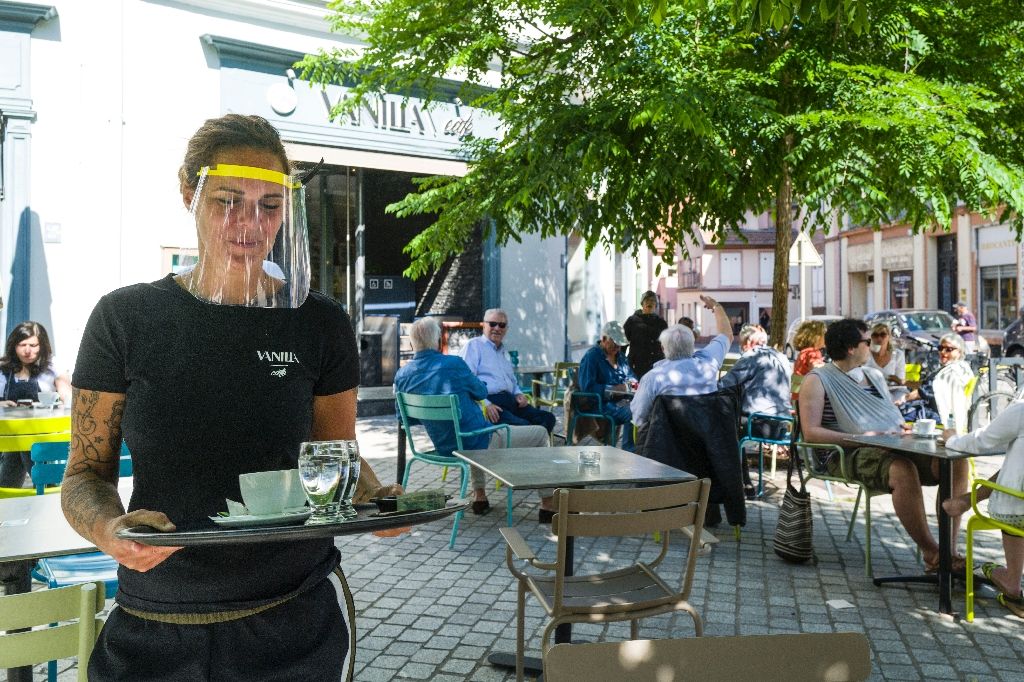French reclaim cafes as virus hammers Latin America
()
(AFP)
The French revelled in a return to cafe terraces Tuesday as Europe emerges from its darkest days of the coronavirus pandemic, which has shifted its centre to Latin America where pressure is mounting on fragile healthcare systems.
The virus has claimed more than 375,000 lives in its more than six-month tear around the globe, upending ordinary and economic life in nearly every country on the planet.
After suffering some of the highest human losses, Europe and the United States are now emerging from months of confinement in a bid to soften the blow of a looming recession.
In the French capital, Parisians reclaimed the beloved morning rituals at cafe terraces that were allowed to sprawl across pavement to accommodate social distancing measures.
“It’s really nice, we got up just for this, so we appreciate it, we’re really happy,” said Charlotte, who made a morning stop at a cafe near the Canal Saint-Martin.
“It’s a bit of a feeling of regained freedom, that’s what it is,” added another patron, 61-year-old Philippe.
Elsewhere in France, bars and restaurants were allowed to go a step further and allow customers to sit inside, while beaches and weddings were also back in business.
The excitement was visible in western Nantes where customers lined up to eat at the restaurant La Prison du Bouffay at one minute past midnight.
Yet the country, which has suffered the world’s fifth highest toll with nearly 29,000 deaths from the virus, still faces tough times ahead with the economy expected to shrink by 11 percent this year due to the pandemic.
A similar story is playing out elsewhere on the continent where schools, swimming pools, pubs and tourist sites are steadily reopening to ease the economic pain of their lockdowns, despite fears of a second wave of infections.
In the UK, British MPs were set to return to parliament in person after ending a virtual system, with plans to debate quarantine requirements for those entering the hard-hit country.
And in the sporting world, Formula One organisers announced an eight-race schedule for Europe starting in July, though fans are not expected to join at the start.
– Rio reopens –
On the other side of the Atlantic, Latin American countries are still facing an upward curve of infections, with cases surging particularly high in Brazil, which has logged the fourth highest number of deaths worldwide.
The region has detected at least one million cases and recorded over 50,000 deaths, more than half of which are in Brazil, according to an AFP tally.
The World Health Organization has warned the region’s healthcare systems could be overwhelmed by the influx of patients, with Peru, Chile and Mexico also seeing high daily increases in infections.
Yet Rio de Janeiro will start gradually easing lockdown measures Tuesday, the Brazilian city’s mayor said, beginning with the reopening of places of worship and water sports.
Mexico also began relaxing restrictions, reactivating the automotive industry, mining and construction even as the country recorded more than 10,000 virus deaths.
Meanwhile, the United States still leads the world with more than 105,000 deaths from COVID-19, though its daily tolls are no longer on a steep incline.
The crisis there has recently been overshadowed by anti-racism protests that have erupted across the country in response to police killings of black Americans.
While many US states had started relaxing virus measures, several major cities have imposed curfews in the face of the protests, which have turned violent in some zones.
– Gatherings hit –
Much of East Asia, meanwhile, has seen infections slow to a trickle in recent weeks, but restrictions on mass gatherings remain.
Hong Kong’s annual candlelight vigil for those killed in China’s 1989 Tiananmen Square crackdown has been banned for the first time due to COVID-19 concerns.
Indonesia pulled out of the annual Islamic pilgrimage to Mecca over coronavirus fears, the religious affairs ministry said Tuesday, removing the largest contingent of worshippers.
And in New Zealand Prime Minister Jacinda Ardern criticised protesters demonstrating in support of America’s Black Lives Matter gatherings for flouting social distancing rules when the country is on the verge of eliminating the virus.
Students wearing face masks returned to schools in Singapore and some workplaces reopened as restrictions were eased Tuesday in the Asian city-state.
But there was alarm from Bangladesh, where an official said a 71-year-old became the first Rohingya refugee to die of the virus in camps for those fleeing Myanmar.
The man was among at least 29 Rohingya to test positive in the shelters, which are home to nearly one million people.
burs-ssm/jv
Maria Elena Bucheli, with AFP bureaus
Disclaimer: Validity of the above story is for 7 Days from original date of publishing. Source: AFP.


